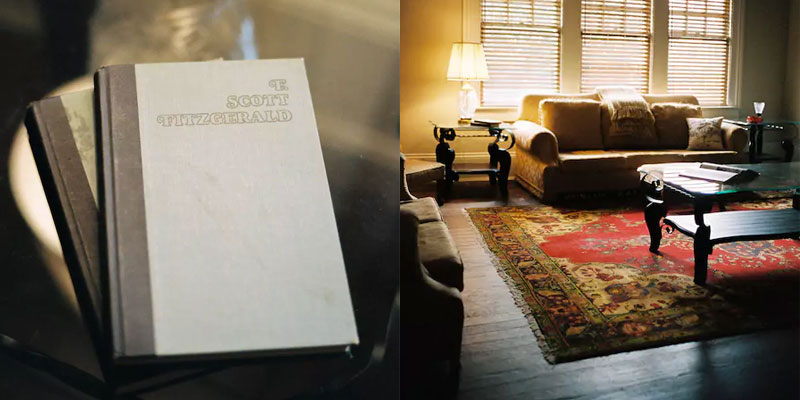As she sat in the house where “Great Gatsby” writer F. Scott Fitzgerald and his wife, Zelda, once lived, a visitor contemplated the famous Jazz Age couple.
“I tried to imagine how maybe Scott would tell a joke and Zelda would laugh,” said Farong Zhu, a Fulbright scholar from China who translated Zelda’s only novel, “Save Me the Waltz,” into Chinese. “Everything was very beautiful. I was so excited to be close to the Fitzgeralds, I couldn’t sleep well the first night.”
But you don’t have to be a literary scholar to stay in this apartment upstairs from the F. Scott and Zelda Fitzgerald Museum in Montgomery, Alabama. The Fitzgeralds lived in the house in 1931 and 1932, and for $150 a night, anyone can rent the apartment on Airbnb. There’s nothing else quite like it in the rental website’s inventory, according to Airbnb spokeswoman Alyssa McEwan.
It’s also the only site on the Southern Literary Trail open to the public for overnight stays. “It’s a wonderful opportunity for travelers,” said trail director Sarah McCullough. “And of course it generates revenue,” always a challenge for historic sites.
Fitzgerald Museum director Sara Powell said she worried when rentals began in April that visitors might throw wild “Gatsby”-style parties. But those concerns proved unjustified. As McCullough put it, “Most of the people who would want to stay there probably have a great love for the writer and the writer’s work and would have great respect for the property.”
The house dates to 1910. The apartment is furnished in casual 20th century style: sofa, armchairs, decorative lamps, Oriental rug, and pillows embroidered with quotes from Zelda like this one: “Those men think I’m purely decorative and they’re fools for not knowing better.” It has two bedrooms, a working kitchen and Wi-Fi, but the ambience evokes another era, with a record player and jazz albums, a balcony and flowering magnolia trees in the yard, all tucked away on a quiet street in Montgomery’s historic Old Cloverdale neighborhood.
“It’s hard for writers to be disconnected from their own world, even for a second,” Powell said. “We’ve had people tell us it was so good to be up there, even for a couple of days. You do unplug and get out of your headspace.”
Though the Fitzgeralds didn’t live in the house for long, Montgomery was important in their celebrated, tumultuous lives. Zelda was a Montgomery native, and they met at a country club here in 1918 during World War I. She was a teenage debutante and he was stationed at a nearby military base.
Once married, rich and rootless, they moved from place to place, including Paris and New York, where a stay on Long Island planted the seed for “Gatsby.” In Montgomery, he worked on “Tender Is the Night” and she wrote “Save Me the Waltz.” It was the last place they lived together with their daughter, Scottie, who turned 10 there and later was sent to boarding school. F. Scott, an alcoholic, died at age 44. Zelda battled mental illness and perished in a hospital fire at age 47.
In the 1980s, the house was threatened with demolition to make way for condos. Local lawyer Julian McPhillips and his wife, Leslie, bought the house and established a nonprofit for it. McPhillips is a Princeton University alumnus; Fitzgerald also attended Princeton, and the museum displays a copy of his Princeton transcript, showing many dropped courses before he left school to join the military. The museum also owns 11 of Zelda’s paintings, personal belongings like an inkwell and beaded purse, and first editions of Fitzgerald’s novels.
As a tourist destination, Montgomery is best-known for civil rights history. This is where Rosa Parks refused to surrender her seat on a bus to a white man, sparking a bus boycott by African-Americans that resulted in the U.S. Supreme Court declaring segregation on public buses unconstitutional. That protest also turned a young Montgomery minister, Martin Luther King Jr., into the leader of the civil rights movement.
In April, two new sites opened in Montgomery that are already attracting a lot of attention: a memorial to victims of racial terror lynchings, and The Legacy Museum: From Enslavement to Mass Incarceration.
Powell is looking for ways to connect with visitors coming to experience these other attractions. She’s developing a workshop for 2019 looking at how race relations were impacted by an 1890s election law named for Zelda’s father, Judge Anthony Sayre, that made it harder for illiterate and semi-illiterate citizens to vote. And while Fitzgerald scholars like Zhu are a natural fit for writers’ residences, Powell is open to proposals on any topic.
Katherine Malone-France, vice president of historic sites at the National Trust for Historic Preservation, says the Airbnb rental and writers’ residencies are great ways to keep places like the Fitzgerald house “financially sustainable and culturally sustainable” while remaining “respectful and relevant to their pasts.”
“That is the best way to preserve something: To use it,” she said.
(Associated Press, copyright 2018)
Sign-up now for our daily newsletter and never miss another article from Yellowhammer News.













